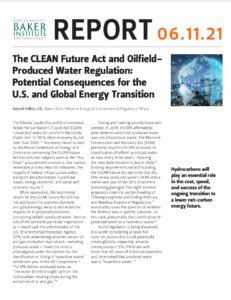Full Title: The CLEAN Future Act and Oilfield Produced Water Regulation: Potential Consequences for the U.S. and Global Energy Transition
Author(s): Gabriel Collins
Publisher(s): Rice University's Baker Institute for Public Policy
Publication Date: June 11, 2021
Full Text: Download Resource
Description (excerpt):
The Climate Leadership and Environmental Action for our Nation’s Future Act (CLEAN Future Act) seeks to transform the United States into “a 100% clean economy by not later than 2050.” Testimony heard to date by the House Committee on Energy and Commerce concerning the CLEAN Future Act has included subjects such as the “Buy Clean” procurement provisions, low-carbon renewable process heat for industries, the impacts of federal infrastructure policy, transport decarbonization, Superfund issues, energy resilience, and social and economic equity.
Gabriel Collins explains why Section 625 of the CLEAN Future Act — which aims to classify oilfield-produced water as a hazardous waste — would likely induce multi-system disruptions severe enough to prevent the bill from achieving its climate, energy, environmental and social objectives.
